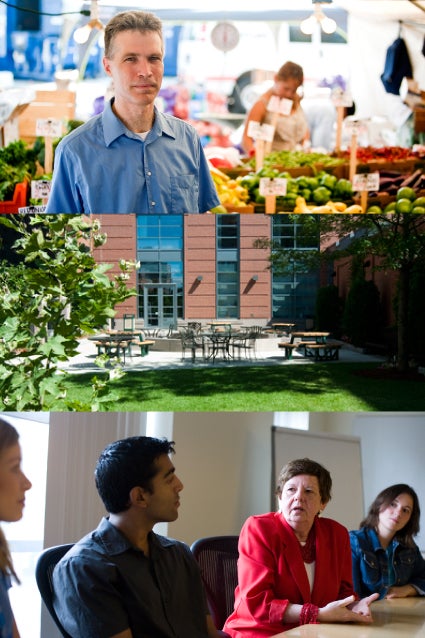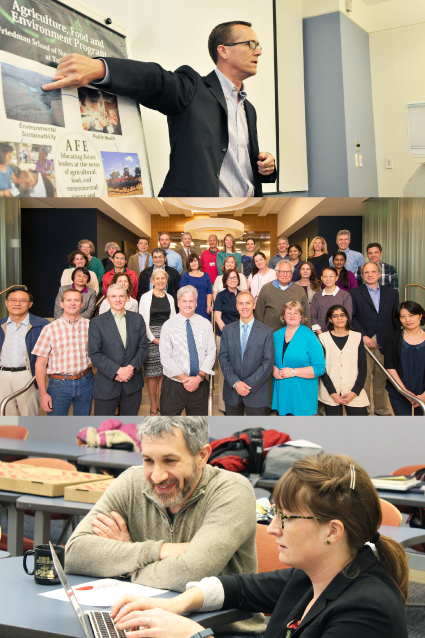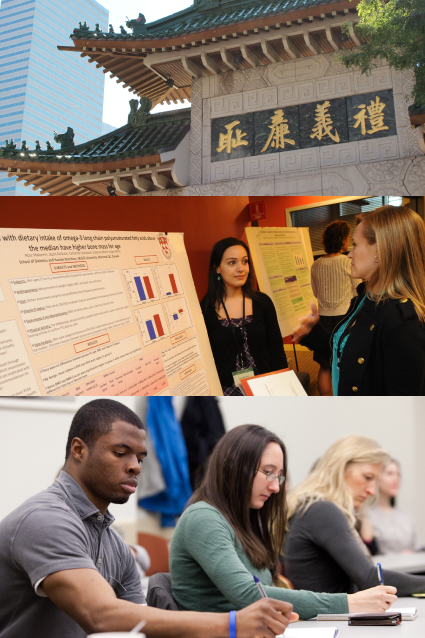Dr. David A. Kessler, who served as the commissioner of the Food and Drug Administration from 1990 to 1997, has an insider’s perspective on how health regulations are decided.

In his address at the 36th graduation ceremony of the Gerald J. and Dorothy R. Friedman School of Nutrition Science and Policy, held at Cohen Auditorium on Tufts’ Medford/Somerville campus, he recalled standing in the Oval Office with President George H. W. Bush and making the case to require a nutrition facts label on all processed foods.
“There are a few of you sitting out there who will take on the big, hard, challenging problems and touch what others see as untouchable,”
The secretary of agriculture, also in the room, argued that such labels would cost the food industry billions of dollars. Kessler, who had recently stopped for fast food, pulled out a tray liner he had pocketed, which listed nutrients and calories for the restaurant’s menu items.
“If it’s good enough for McDonald’s, it should be good enough for the Department of Agriculture,” Kessler said. The president replied, “Well, I guess that’s true.”
“And that’s how policy is made,” said Kessler.
“Some of you will work as pioneers on the microbiome and the interaction of food and the immune system, and tackle devastating diseases such Crohn’s and colitis,” he said. “The answers are waiting for your commitment.” To have an impact, he said, will take “persistence and commitment, persistence and grit.”
Kessler has served as dean of the medical schools at Yale University and the University of California at San Francisco, where he is currently a professor of pediatrics and epidemiology and biostatistics. He is also known for his best-selling books, including The End of Overeating: Taking Control of the Insatiable American Appetite, Your Food Is Fooling You: How Your Brain Is Hijacked by Sugar, Fat, and Salt, and his most recent book, Capture: Unraveling the Mystery of Mental Suffering.
He said that nutrition currently has the public’s attention. “But we must do a better job and have more to show for it than shelves full of gluten-free products,” he said.
“There are a few of you sitting out there who will take on the big, hard, challenging problems and touch what others see as untouchable,” he told the 117 degree recipients. Kessler lived that fight in his own career-defining campaign against the tobacco industry. “It took 15 years, but ultimately the president and Congress gave the FDA the authority to regulate cigarettes,” he said, including rules on the marketing and sale of tobacco to children.
“Some of you will work as pioneers on the microbiome and the interaction of food and the immune system, and tackle devastating diseases such Crohn’s and colitis,” he said. “The answers are waiting for your commitment.” To have an impact, he said, will take “persistence and commitment, persistence and grit.”
“You have earned the highest privilege in life, to touch the lives of others,” he said. “Your work can improve the health of all of us.”

The dean of the school, Dariush Mozaffarian, in his charge to the graduates, said that one student told him that she chose the Friedman School over another prestigious public health school because of a small detail: the Friedman School offered her nuts, fruits and veggies as snacks, while the other school served cookies and soda. “I wanted to go somewhere that put their mouth where their mouth is,” she said to him.
Mozaffarian said it is small choices such as what snacks to serve that drive the world. “Small choices about what to buy at the grocery store; small choices by industry that lead to healthier, more sustainable food systems; small choices by governments that empower women and livelihoods; small actions that lead to breakfast for a low-income child, improving their attention and learning on that day; small actions that lead to the acceptance of differences, the celebration of diversity and social justice.”
Alison Brown, N17, who received her doctorate, gave the class address. In her time at Tufts, she has received the Gershoff-Simonian Award for Research Excellence in Nutrition Science and Policy as well as the Tufts Presidential Award for Citizenship and Public Service. But when she applied to Tufts, she was uncertain she belonged here. She was drawn to the Friedman School’s innovations in research and public health, but was concerned about moving to Boston, which she had grown up hearing stories about. “The city’s history of bussing and racial and economic segregation had left its imprint in my mind,” she said.
“With this discomfort, however, comes opportunity. With this discomfort comes the moment to advocate for the changes we want to see. A moment for us to make an impact and put to good use the training that we have been afforded.”--Alison Brown, PhD

The reality, she found, was five years of working with amazing researchers, classmates and colleagues. She thanked many by name, as well as her fellow Friedman Justice League members, who she said have worked alongside the administration to embed the values of diversity and inclusion into the school’s current and future plans, while also organizing school-wide efforts focusing on justice in the food system. “Thank you for your commitment to equity,” she said.
She said the current political climate has left many people uncomfortable, including scientists compelled to defend the importance of science-backed policy. “With this discomfort, however, comes opportunity,” she said. “With this discomfort comes the moment to advocate for the changes we want to see. A moment for us to make an impact and put to good use the training that we have been afforded.”
Excerpted from commencement story on Tufts Now "Standing Together" by Helene Ragovin







